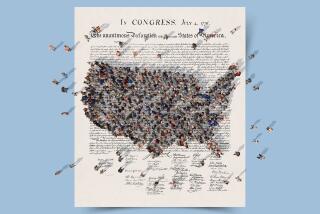Rewarding ‘Good Apples’
The corruption of business and the decay of values besetting our nation reach toward a heightened question: What is the meaning of this treasured thing we call freedom? Not in the abstract or the grandiose, but freedom in the day-to-day conduct of our lives, in our expectations for ourselves, our institutions and our country.
Unfortunately, when the meaning of freedom is in play in the United States, there is that old Catch-22. Free people set the terms of freedom for themselves. In this free country right now, it matters not whether the exercise of freedom serves only the self, even if at the expense of others. To challenge that idea, we are told, is an infringement on freedom. One is free to believe that freedom entails corresponding responsibilities, or that it does not.
Thus, even with our nation under attack, 37% of college students polled last month said they would evade military service if drafted. Freedom, we see, is one of those things that can circle around and swallow itself by the tail.
In this poll, commissioned by William J. Bennett’s Americans for Victory Over Terrorism, 79% of college students said they believed that Western culture, with its wide-open freedoms and promises of self-determination, was not superior to Arab culture, which lacks a single democratic example among nations and offers citizens almost none of the freedoms we take for granted except, of course, the freedom for some individuals to accumulate wealth. That’s a freedom that Osama bin Laden and Saudi oil princes relish.
In the years before the Civil War, Abraham Lincoln stated that true freedom allowed that “each man should do precisely as he pleases with all which is exclusively his.” But, as Lincoln recognized a few years later, freedom without principles at the center can be its own tyranny. The war between the states took half a million lives to settle the most fundamental question of freedom: freedom for slaves versus the freedom to own slaves.
Now another divide separates Americans. The reckless freedom to pursue self-interest, most extravagantly displayed by entrepreneurs with their disregard of all else, has taken a toll on the faith and futures of millions of people. Yes, millions.
The “bad apple” theory of corporate responsibility ignores the naked fact: Our system offers too few incentives anymore for “good apples.”
Those Americans who live by principle, who still believe in citizenship, who hold faith in the axiom that honest work counts most, they may take satisfaction if a few of the greediest corporate knaves are made to squirm and suffer. But good apples deserve more out of this mess: They rate a rejuvenated system tilted in favor of duty, honor, obligation, progress--all those old-fashioned ideals that once defined freedom.
In other words, the ship of state could use some ballast along with the fancy superstructure. It’s one thing, as the president has done, to exhort high principles. It’s another, which he overlooks, to reward these values above narcissism--beginning, perhaps, with tax revisions to favor the fruits of work over trust fund income or the dumb luck of inheritance. Also, tax laws that reward volunteerism the same as philanthropy. And laws that encourage companies to invest in the United States and American workers--not out of xenophobia but in support of the ideals and institutions that make their success possible.
The government is overdue in restoring our founding principles and granting corporate charters in the public interest, not singularly for the benefit of business. One could dream up 50 good ideas in this vein.
It may make ledger-book sense these days for a company like Aquila Inc. to pay $30 million in bonuses to executives who fire 500 employees with the goal of saving shareholders $35 million in payroll. But it should not. It’s neither saccharine nor Pollyannaish to say that freedom would mean more if incentives were recalibrated to favor those who build rather than tear down. Adam Smith, sage of modern free-market philosophy, is sometimes overlooked for his contributions to idealism. “How selfish soever man may be supposed,” he wrote nearly 250 years ago, “there are evidently some principles in his nature, which interest him in the fortune of others, and render their happiness necessary to him.” In a free society, we have the freedom to insist that these principles be rewarded, and we should.
More to Read
Sign up for Essential California
The most important California stories and recommendations in your inbox every morning.
You may occasionally receive promotional content from the Los Angeles Times.









